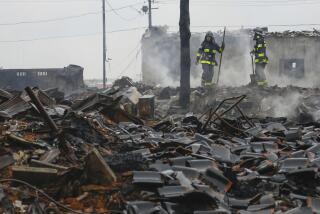With Japan’s Relentless Heat Wave, It’s Boom or Bust : Asia: The drought boosts rice yield but damages other crops. Sales of disposable dinnerware skyrocket, but parched factories feel the pinch.
- Share via
TOKYO — Vegetables are withering on the vine, but rice is thriving. Sales are booming, but factories are beginning to cut back or halt production. It’s all because of a heat wave that has been blessing and plaguing Japan all summer--and which shows no signs of letting up.
Symbolic of the double-edged impact of the heat and its accompanying drought were two announcements from the Agriculture Ministry that Japan is likely to enjoy its best rice crop in eight years this fall--5% above normal--even as overall agricultural losses from the drought already have reached an estimated $597 million as of Friday.
The same sunlight that helped ripen rice grains in well-irrigated paddies has parched other crops, such as vegetables and fruit that are grown in non-irrigated fields.
Hit worst, the ministry said Monday, were growers of mikan (mandarin oranges), who feared that half of their annual earnings would be lost without rain by the middle of September.
And while supermarkets Monday reported their first year-to-year monthly increase in sales--4.6%--in two years in July, manufacturers in drought-stricken areas faced more bad news.
Officials in Imabari on the island of Shikoku closed valves at all 18 factories throughout the city, shutting off the supply of industrial water to plants that produce 55% of Japan’s domestic output of towels. The towel industry employs 30,000 workers--half of the labor force and a quarter of the population of the city of 120,000 people.
No indication was given about when water supplies might be resumed.
Throughout Shikoku, sales of items like wooden chopsticks, aluminum foil, paper cups and paper plates have soared as families try to curtail use of water for dishwashing. A hospital in Takamatsu that normally gives patients baths daily has cut back to one bath every three days.
Elsewhere in western Japan, oil refineries and petrochemical plants, both of which use industrial water as coolants, have been transforming oil tankers into water carriers since late July.
At the Japan Energy Co. oil refinery in Kurashiki on the main island of Honshu, a tanker arrived Monday from Vietnam bearing some of the 59,000 tons of water that the refinery has been forced to order to keep operations going at 70% of capacity.
“Whatever could be called water--we have been reusing it since early July,” said Yoshitomi Ebina, a spokesman for Japan Energy Co. “We have been gathering even steam for recycling.”
A lack of facilities to load water into tankers at its other locations in Japan has forced the company to turn to imports from Hong Kong, China and South Korea in addition to Vietnam, Ebina said. “We have done all that is humanly possible. The rest is up to heaven,” he said.
But the weather bureau has said that except for parts of the northern island of Hokkaido, sunshine is expected to prevail across the country for the rest of the week.
Refineries and petrochemical plants in western Japan have mobilized more than 150 tankers--or about one in every five engaged in coastal shipping of refined petroleum products--to transport water from sections of Japan where the drought has not been so severe.
Reservoirs in both Imabari and Kurashiki are expected to hit bottom by mid-September unless rain falls before then.
Ironically, rice farmers find themselves facing the prospect of an oversupply after a year of shortages.
Last fall, Japan was forced to lift its ban on rice imports after a cold, rainy summer left the country with a rice harvest that was 26% below normal, and by this summer it had imported more than 2 million tons from the United States, Australia, Thailand and China. Now, a surplus of 2.5 million tons looms next year.
Atop an expected harvest of 11 million tons--1 million tons more than ordinary consumption--warehouses are filled with 1.1 million tons of excess imports this year. And under an international trade agreement, Japan will be obliged to import 400,000 tons, or 4% of its annual demand, next year.
Even Japanese baseball has been weather-stricken.
Normally, so many regular season games are rained out that a three-week period is set aside after the season to allow teams to complete their full schedule before the “Japan Series” begins in late October.
But this year, so few rain-outs have occurred that fans fear that the Central and Pacific league champions will go into the Series cold if they have no games to make up during the three-week layoff.
Temperatures in Tokyo hit 91 degrees Tuesday. An all-time high of 102 was recorded Aug. 3.
More to Read
Sign up for Essential California
The most important California stories and recommendations in your inbox every morning.
You may occasionally receive promotional content from the Los Angeles Times.










